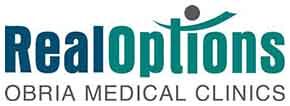A Comprehensive Guide to STDs: Questions, Myths, and Facts (Part One)

In this ever-changing world, one thing remains constant: the importance of understanding our bodies and our health. At RealOptions Obria Medical Clinics, we are dedicated to providing you with valuable information and compassionate care, particularly when it comes to the topic of sexual health and sexually transmitted diseases (STDs) or infections (STIs). Today, we will be starting the first part of a series that is aimed at addressing some of the most frequently asked questions about STDs and STIs, aiming to debunk myths and establish facts. Let’s get started!
What is the difference between STD and STI?
Let’s start with the basics. STD stands for “sexually transmitted disease,” and STI stands for “sexually transmitted infection.” They are often used interchangeably, but there’s a subtle difference. STDs are infections that have developed into a disease state, causing noticeable symptoms. On the other hand, STIs may not always cause symptoms, though they can still be transmitted. These are usually acquired through unprotected sexual contact with an infected individual.
What’s the most common STD?
Human Papillomavirus (HPV) is the most common STD in the United States. However, many people with this infection show no symptoms. HPV can lead to severe health problems but is preventable with vaccines.
What are the chances of having an STD?
Sexual behavior significantly affects the likelihood of having an STD. Those who have unprotected sex are at high risk. Even if someone has only had one sexual partner, that partner could have a disease. Remember, the risk isn’t just about the number of partners but also about the precautions taken during sexual activity.
What STDs are not curable?
According to the World Health Organization, eight pathogens are most commonly associated with STIs. Four are curable: syphilis, gonorrhea, chlamydia, and trichomoniasis. The remaining four, hepatitis B, herpes simplex virus (HSV), HIV, and human papillomavirus (HPV), are currently incurable viral infections.
Should I get tested after every partner?
The CDC recommends routine testing for sexually active individuals. If you have multiple or anonymous partners, consider getting tested more frequently, like every three to six months. And remember, a new test is advised after every new partner.
How soon after unprotected sex can I test for STDs?
The “window period” varies for different STDs. For instance, HIV might take up to three months to show up on a test, while gonorrhea, chlamydia, and syphilis can be detectable within days to a few weeks. Practicing safer sex, including the use of condoms, significantly lowers your chances of contracting or spreading STDs.
Can you get tested for STDs at a pharmacy?
Some pharmacies, like CVS, provide testing for certain STIs. However, for comprehensive testing and accurate results, we recommend visiting a healthcare provider or a specialized clinic like ours. If you’d like to get tested, schedule an appointment here.
How long do STD results take?
The waiting period for STD results can vary. Some tests provide results within a few days, while others may take a week or two. The method of receiving your results is often up to you, whether that be a phone call, an email, or a visit to our clinic.
Why are my STD results taking so long?
Several factors can contribute to the turnaround time for STD results. The type of test, the laboratory’s processing capacity, and the transportation time between the clinic and the lab can all affect how long you have to wait. At RealOptions Obria Medical Clinics, we strive to deliver results as swiftly as possible while maintaining accuracy and confidentiality.
How do you treat an STD without going to the doctor?
When it comes to STDs, self-diagnosis and treatment are not recommended. Proper treatment of STDs is vital to prevent complications, and that requires professional medical diagnosis and appropriate medication. Always consult with a healthcare provider if you suspect you have an STD.
How can I test for STDs at home?
There are home testing kits available for some STDs, which may be a good initial step if going to a clinic is not possible. However, they should not replace a full evaluation by a healthcare provider, which is more accurate and comprehensive.
Is it a crime to transmit an STD in California?
California law doesn’t specifically require a person to disclose an STD to a former or current sexual partner. However, it is considered a misdemeanor to intentionally transmit or willfully expose another person to venereal disease or an infectious or communicable disease, which includes STDs and HIV. If you have concerns or further questions about your legal rights and responsibilities with regards to STDs and your or your partner’s sexual health, you should contact a legal professional. California has organizations that provide free legal help to qualifying individuals.
Does chlamydia go away?
Chlamydia can be treated successfully if you take all of the prescribed medication. When taken properly, it can eliminate the infection and reduce your chances of having complications later.
Can any antibiotics treat chlamydia?
Yes, chlamydia is a bacterial infection that is treatable with specific antibiotics. The CDC recommends either doxycycline (taken twice daily for seven days) or azithromycin (taken as a single, larger dose). Always remember to complete the full course of treatment, even if your symptoms subside earlier.
Is syphilis curable?
Indeed, syphilis is another bacterial infection that can be successfully treated with the right antibiotics, as suggested by your healthcare provider.
How is syphilis treated?
Syphilis is treated with antibiotics (specifically, the drug penicillin, which is very effective in combating the disease). The length and method of treatment depend on the stage of the disease and the symptoms present. It’s critical to take all the medicine prescribed by your healthcare provider, even if the symptoms disappear. After treatment, regular follow-up tests are needed to ensure the infection has been completely eradicated. As always, treatment plans should be discussed with a healthcare professional. If you’d like to discuss your testing and treatment options for syphilis or any other STD, schedule an appointment with us.
Wrapping Up
Our purpose at RealOptions Obria Medical Clinics is to empower you with knowledge so that you can make informed decisions about your health. It’s normal to have questions, and we’re here to provide answers. Schedule an appointment at one of our clinics today!
Remember, your health is invaluable. Keep asking, keep learning, and keep prioritizing your well-being!
